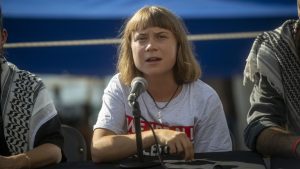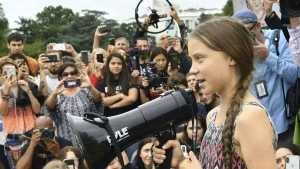Israel Denies Reports of Mistreatment of Greta Thunberg and Gaza Flotilla Activists
In recent days, serious allegations have emerged from activists detained by Israeli forces after an attempt to sail toward Gaza, claiming they were subjected to mistreatment, abuse and humiliating conditions during their detention. Among the detained is Swedish climate activist Greta Thunberg, whose high profile has drawn extra scrutiny. Israel, meanwhile, has denied the accusations strongly, calling them fabrications and insisting that detainees’ rights have been respected.
Allegations from Detained Activists
Activists aboard the Global Sumud Flotilla, which entered waters near Gaza in a symbolic effort to challenge the Israeli naval blockade, report a litany of abuses during their interception and detention. Some of the claims include:
-
Sleep deprivation, denial of medication and basic medical care
-
Being forced to kneel for extended durations, and threats using dogs or weapons
-
Psychological intimidation, verbal abuse and humiliation
-
Physical assaults including dragging, slaps and forced posing with flags
-
Confinement in overcrowded or unsanitary conditions, with insufficient food and water
Those who have been released and deported say they witnessed these conditions firsthand and recount a pattern of mistreatment as part of a broader punitive posture toward dissent. Several detainees, including Australian participants, assert that treatment in custody was harsh and degrading.

One activist said guards “dragged her hair,” mocked prisoners, and forced them to look away or keep their heads lowered. Others allege being shackled with zip ties, denied access to legal counsel or family, and subjected to aggressive tactics intended to instill fear. In the case of Greta Thunberg, some activists claim she was forced to hold unidentified flags or was publicly paraded — allegations intended to humiliate.
Israel’s Firm Denials and Official Account
Israel’s Foreign Ministry has responded swiftly and firmly. In its official statements, it described the allegations as “brazen lies” and insisted that the detainees’ legal rights, access to medical care, food, water and legal counsel were fully upheld. According to Israel, Thunberg and other detainees reportedly declined to expedite their deportation, opting to remain longer in custody, and crucially, court records show Greta made no formal complaint of ill-treatment in her detention.
The ministry further emphasized that Thunberg had requested to return to Sweden and sought to provide medications to other detainees but made no direct accusations about her own treatment. In the courts, her case was processed under immigration procedures without records of complaints lodged.
Adding to the official posture, among critics and government hardliners, Israel’s National Security Minister Itamar Ben-Gvir adopted a harsher tone. He characterized the activists as supporters of terrorism and expressed “pride” that they were treated under conditions analogous to those for terror suspects. His framing underlines the polarized and incendiary context in which these events are unfolding.
A Clash of Narratives and International Fallout
This controversy has become a flashpoint in international debate. Supporters of the flotilla and human rights organizations argue that the reported mistreatment points to systemic violations that demand investigation and accountability. For them, the treatment of high-profile activists like Thunberg is symbolic of how dissenters are handled in conflict zones.
On the flip side, Israel presents a narrative of security enforcement, asserting that it acted within legal bounds to intercept vessels violating its naval blockade, and that detainees were treated in line with due process. The government warns that flouting the blockade and entering restricted waters pose security risks.
Internationally, the incident has triggered diplomatic reactions. Sweden, Greece, Australia and other nations with detained citizens have sought consular access, transparency and assurances of humane treatment. Pressure is mounting for independent oversight, human rights audits and credible investigations to bridge the conflicting claims.
What Lies Ahead
The crux now lies in whether impartial investigations will be conducted. Independent monitoring by human rights bodies or international observers may help examine the allegations credibly. Legal teams representing the detained activists could potentially push for judicial review of detention conditions, evidence gathering, and accountability mechanisms.
Media coverage, international pressure, and diplomatic engagement will likely intensify in coming days. If substantive proof of mistreatment emerges, Israel may face serious reputational consequences and possibly even legal claims under human rights frameworks.
For Greta Thunberg and other detained activists, the case is personal. How she was treated, whether her account aligns with court records or activist testimonies, will be keenly watched by supporters, critics and neutral observers alike. At stake is not just her narrative but a broader question: how states should treat detained protestors, especially in contested and conflict-sensitive environments.
In any case, this episode highlights deeper tensions: between security and rights, between narrative and evidence, and between governments and civil society actors who push the boundaries of protest. The coming weeks may determine whether this becomes a closed incident or a catalyst for greater scrutiny of detention practices and rights under duress.

